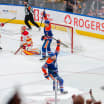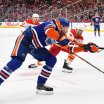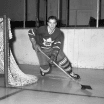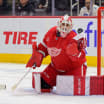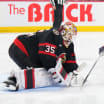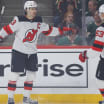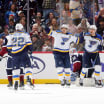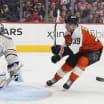Scheifele leads Jets into Game 3 with growing maturity
Center driven to win Stanley Cup, but Winnipeg trails Blues 2-0 in first-round series

Trailing 2-0 in the best-of-7 series after consecutive home losses to the St. Louis Blues in the Western Conference First Round, a tantrum is the last thing they'll need in Game 3 at Enterprise Center on Sunday (7:30 p.m. ET, CNBC, CBC, SN, TVAS2, FS-MW).
"Composure definitely wasn't always my strong suit," Scheifele said. "I've definitely gotten a lot better at that side of things over time."
RELATED: [Complete Jets vs. Blues series coverage]
It's a good thing he has. He'll need every ounce of maturity he has developed to help the Jets out of this early hole in the Stanley Cup Playoffs.
Scheifele's will to win has always been strong but required nuance and focus as he aged. Consider it a work in progress over a long time.
The youngest of three siblings (his sister Janelle is 32, his brother Kyle is 28), the 26-year-old recalls more than one petulant outburst when he didn't get his way or win at something as a child.
The best example is one he remembers clearly, a summer soccer game with family members and neighbors at a field not far from their home in Kitchener, Ontario. In a rage after defeat, he picked up one of the buckets used to mark the goals and chucked it at one of his neighbors.
"I was the youngest child, though, so I got picked on a little bit," he said. "I always had to try to prove my worth. I think it was my competitive side, that I didn't want to lose and if I lost, I couldn't handle it and would snap. My parents were on me about it and my friends weren't super happy when I was snapping so it forced me to change."

- Chapters
- descriptions off, selected
- captions settings, opens captions settings dialog
- captions off, selected
- Unknown Captions
This is a modal window.
Beginning of dialog window. Escape will cancel and close the window.
End of dialog window.
This is a modal window. This modal can be closed by pressing the Escape key or activating the close button.
STL@WPG, Gm2: Scheifele pots PPG from the circle
Gary Roberts has had an up-close view of Scheifele's drive since the summer of 2013. He's uniquely qualified to evaluate a player's will to win, not just as Scheifele's personal fitness trainer but as a former NHL forward who played 21 seasons, won the Stanley Cup with the Calgary Flames in 1989 and overcame a serious neck injury and nerve damage in 1995-96.
"Now Mark looks at himself as a leader," said Roberts, whose program includes several elite NHL players like Connor McDavid of the Edmonton Oilers and Steven Stamkos of the Tampa Bay Lightning. "I see two players (Scheifele and Jets captain Blake Wheeler) who are driven to be leaders on that team and I think what drives Mark now is to win the Stanley Cup and continue to be great."
That drive is what connected Scheifele with Roberts in the first place.
Scheifele was the No. 7 pick in the 2011 NHL Draft but failed to stick with the Jets after his first two training camps in 2011 and 2013 after the lockout. He said in the 11 NHL regular-season games he played as an 18- and 19-year-old, he knew he was in over his head, even to the point of discouragement, so he went looking for a solution to the problem.
"He was a thinker," Roberts said. "When I first met him and he started training with us, right away I said, 'This kid's a sponge.' I would say Mark Scheifele, right from the beginning, understood that I was really serious about preparation and I had a certain way of teaching it and showing young players what it was going to take for them to reach the next level.
"And I think he got that right away."
That Scheifele would find a way to train better and to stay in the NHL hardly surprised Colin Behenna, who played two seasons with Scheifele with Barrie of the Ontario Hockey League.
Behenna was Barrie's captain and Scheifele's linemate for the second of those seasons, 2011-12.
"When I watched him in Barrie, there was no doubt in my mind he was going to be something pretty special," Behenna said. "He was one of those guys where you just know. He works harder than anyone else. And the passion and love for the game to get better, and to work on the smallest little things, you could that with time and maturity, it was going to develop into something special and it has."

- Chapters
- descriptions off, selected
- captions settings, opens captions settings dialog
- captions off, selected
- Unknown Captions
This is a modal window.
Beginning of dialog window. Escape will cancel and close the window.
End of dialog window.
This is a modal window. This modal can be closed by pressing the Escape key or activating the close button.
NYI@WPG: Scheifele redirects shot past Lehner for PPG
Scheifele's billet family in Barrie had an outdoor rink and the Colts found out that Scheifele was spending most of his free time on it, working on his shot, his moves and his game.
"We had to tell him to stop, that he was going too much, to get off that ice to rest his body," Behenna said. "The fact you have to tell someone to limit that, it's a testament to how much work he was putting in."
Roberts tells a similar story. He said he's impressed with how "all-in" Scheifele has been from the start of their relationship but said he has more than once pleaded with him to cut himself some slack.
"I'm the guy who tells Mark Scheifele to go have a cheeseburger and relax," Roberts said. "And 'listen, kid, go on a vacation, go away for a few days, get away from here.' I'm trying to push Mark Scheifele away from the gym."
As with his temper and excessive training, Scheifele's self-confidence has not always been a strong suit.
Scheifele has battled anxiety since he was a kid. He said he still faces it occasionally and that it's nothing to be afraid of.
As his career has progressed, he has benefitted from talking with sports psychologists, learning that things like positive self-talk and breathing exercises help him return to a calm state of mind.
Another key for Scheifele in coping with stress and anxiety has been prayer.
He was raised in a Christian family and has become the chapel leader among the Jets.
"I think it's something that has always kept me on the straight and narrow, always having God in my life and having that belief that everything happens for a reason," Scheifele said. "No matter the time or place, I always have my parents I can talk to, but I know at 4 a.m. if I can't sleep and something is stressing me out or there's something I'm dealing with, I always have God there to talk to.
"It's something that's always kept me humble."

- Chapters
- descriptions off, selected
- captions settings, opens captions settings dialog
- captions off, selected
- Unknown Captions
This is a modal window.
Beginning of dialog window. Escape will cancel and close the window.
End of dialog window.
This is a modal window. This modal can be closed by pressing the Escape key or activating the close button.
DAL@WPG: Scheifele bats away puck from goal line
Scheifele said he's been reluctant to talk much about his faith but has recently been more open about it.
"I've always been the kind of guy that, well, people would rather see a Christian than hear a Christian, so that's always been my motto, that I want to be someone to be like, that you know there's something different about him, that he shines a different light than most and I don't have to go out and preach to anyone or hit people over the head with a Bible," he said. "I want my actions to show I'm a Christian, a person of faith. I'm definitely happy to share my story and my journey with God. It's a pretty big part of my life but I definitely am not going to hit you on the head with a Bible to try to show you who I am."
Scheifele's will to win doesn't have an off switch, even outside of hockey.
Last summer, he and his friend Ben Fanelli went to play pickleball one day and during the friendly match, as a lark, they propped up a phone camera to record some of the action. Later, over dinner, Scheifele pulled out the phone, cued up the video and started studying and analyzing it.
Fanelli was amused and amazed, but hardly surprised.
"He was trying to figure out how he could get better at pickleball," Fanelli said. "He takes it to the next level, that he makes everything a competition. He will do everything he can to win.
"He just grew up that way."
Scheifele's intense desire to win is fueled even more in the Stanley Cup Playoffs. Last season, Scheifele set a postseason record by scoring 11 goals on the road, helping the Jets reach the Western Conference Final, where they lost in five games to the Vegas Golden Knights.
"Obviously it's a cool thing but the way I look at it is that it didn't really get us anywhere," said Scheifele, who had 14 playoff goals last season, second-most in the League behind the 15 scored by Alex Ovechkin of the Cup-winning Washington Capitals. "We got to the conference final but it doesn't really matter unless you win the Stanley Cup. Obviously, you gain that experience from it but at the end of the day, you're not here to get NHL records, you're here to win Stanley Cups."
Winnipeg finished second in the Central Division this season and lost the first two games of the series to the Blues, 2-1 in Game 1 and 4-3 in Game 2.
Now, the Jets look, in part, to Scheifele to help pull them out of the playoff hole they are in.
"He wants to be the best at everything," Fanelli said. "For him, it's an almost innate need to be in control or dominating in a certain way. In his mind, it's almost like that is the norm, to be successful and the best. And he focuses on that, and not just hockey, so then everything else falls into place."
